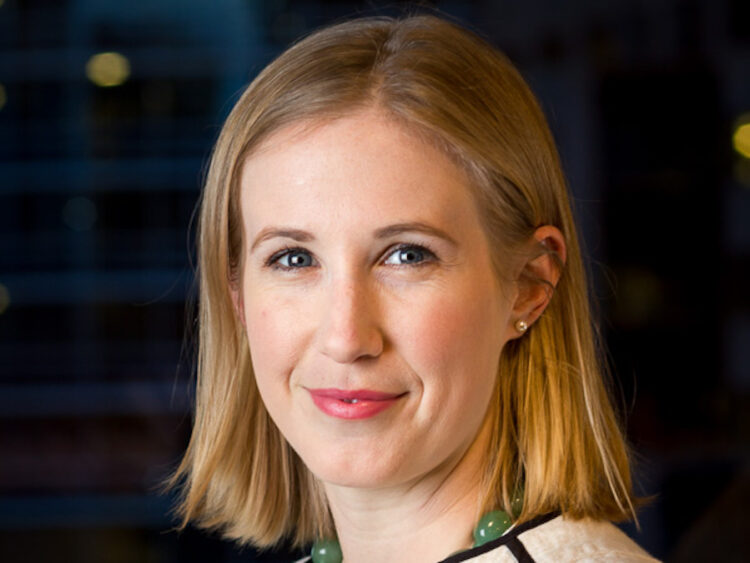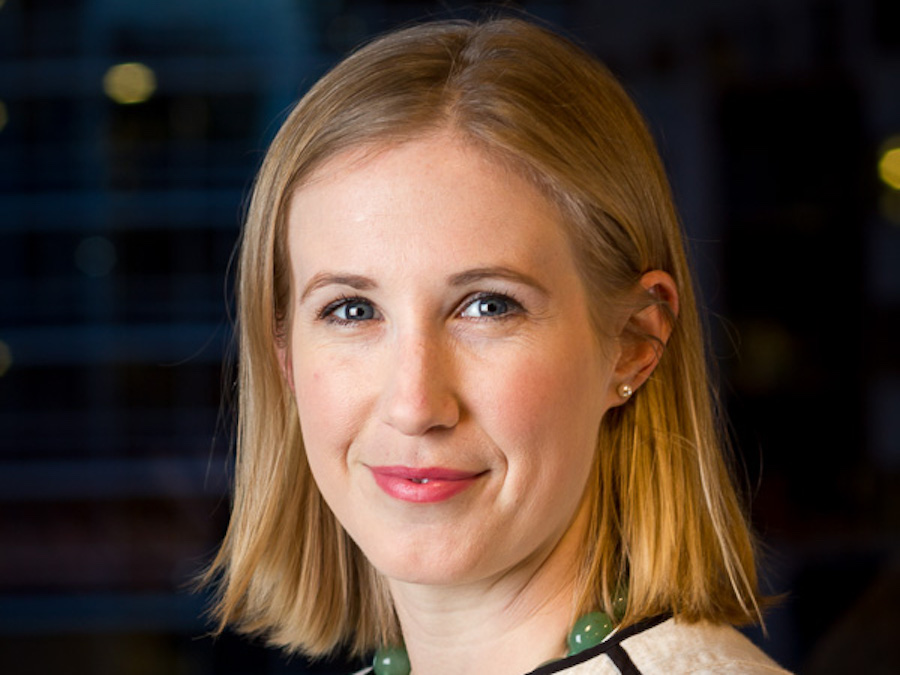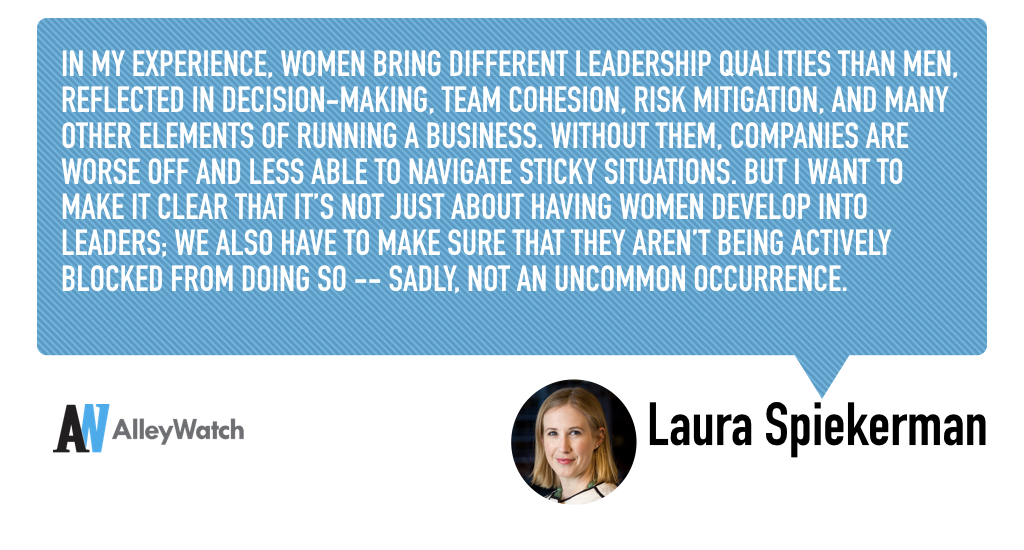Are you a woman in NYC Tech and interested in participating in this series? Make sure to read the whole article…
Much has been said and written about the lack of women in the tech sector, be it as investors (or associates), founders, or in management positions at major companies. Is the problem the old boys network – or that success in technology is seen as a young man’s game? In this series, we speak with some of the top women in tech in New York as they discuss the challenges they face, the perceptions that need to be changed and the work that’s being done – or not – to help to promote women in tech.
Today we speak with Laura Spiekerman, the cofounder and CRO at Alloy. After being Kopo Kopo’s first hire, Laura decided to skip Law School and head to Kenya to work on a software startup leveraging mobile payments. Returning to the Bay Area, Laura knew she had to continue pursuing her passion for Fintech and began working on Alloy. With her roots in NYC, Laura eventually returned to the city with Alloy joining Techstars and found her niche in the NYC fintech community. Laura is an active member of the NYC community and an advocate for social change.
Laura Spiekerman of Alloy
What’s your background and how did you develop your career as a female entrepreneur in the NYC tech ecosystem?
I started my fintech career as the first employee at Kopo Kopo. I abandoned a plan to go to law school and got on a plane to Nairobi, Kenya, to join the two cofounders who had built a software system to enable small businesses to leverage M-PESA/mobile payments. When I moved back to the United States, I joined a small ACH payments startup, which eventually failed, but in that time I became increasingly interested in financial services infrastructure. When I left, my cofounders and I became obsessed with figuring out how to make it easier for developers and entrepreneurs (and eventually banks) to handle the tedious-but-crucial elements of financial services infrastructure, starting with compliance, and bringing it into the age of APIs and big data. We moved to NY in July 2015 to do the Techstars NYC program and immediately recognized the value of being here as a fintech startup.
What are the advantages of being a woman in tech?
The advantages are few and far between! One thing I’m grateful for is the community that I’ve become a part of around being a woman in tech, and specifically a woman in fintech. Being part of a smaller, disadvantaged group means that we’re closer knit and more supportive than if we were part of the status quo.
What can be done to further promote female entrepreneurs and women in tech in New York?
New York is already a better ecosystem for women than Silicon Valley. (For evidence, check out the Female Founders Fund reports). That’s not to say it’s a friendly ecosystem — it still needs so much work! Investors, women and men alike, need to make an effort to meet with more women, talk about their biases, and be proactive in their approaches. These same investors need to stop making pipeline excuses.
There also need to be more focused ecosystems within the New York tech scene. For example, there are a couple of informal women-in-fintech groups of which I’m a part in San Francisco, but I haven’t come across those in New York. That effort could start with our investors, accelerators, or entrepreneurs themselves. I don’t see anyone taking that lead right now. The existing networks (e.g. Joanne Wilson, Female Founders Fund, SheWorx, etc.) are great but I’d love to see some more industry-focused groups and events.
What is diversity to you and do you see it evolving in tech?
Diversity, of course, encompasses much more than gender or race, but the tech community has struggled to evolve. I’ve found that when women or people of color are brought into the community, it’s often that they’ve had to adopt certain characteristics and mannerisms (including feigning confidence and swagger!).
Why do you think it’s important that women retain, grow, and develop into senior roles within their organizations?
In my experience, women bring different leadership qualities than men, reflected in decision-making, team cohesion, risk mitigation, and many other elements of running a business. Without them, companies are worse off and less able to navigate sticky situations. But I want to make it clear that it’s not just about having women develop into leaders; we also have to make sure that they aren’t being actively blocked from doing so — sadly, not an uncommon occurrence.
How do you see the future of teams and interactions in a diverse environment and what implications will this have?
If teams diversify, startups will be better positioned to succeed — they can avoid some of the pitfalls that succumb many teams, by making better decisions, taking into account certain risk factors, taking care of nuts & bolts that may otherwise be ignored) and create better products for their customers. Too often these products and services are created in bubbles for a homogeneous audience.
How can women rise in the ecosystem and what are the unseen barriers?
Sexism is the primary unseen barrier. It is everywhere and is not spread only by men. Unconscious bias is a fact of life, and must be treated as such — we must acknowledge our judgments, and figure out how to work around them, whether that’s in recruiting, fundraising, or networking. On that last point, women’s networks need to be supported and strengthened. I’ve been most successful when supported by other people in my network, whether that’s customer referrals, VC introductions, or invitations to speak on panels.
Please tell us about a few organizations that you are involved with or respect that are promoting women in tech.
To name a few: Femtech Leaders, SVB’s Women in Fintech events, Female Founders Fund and YC’s Female Founders group
What can men do to participate in this discussion?
Host these discussions! If you’re a VC or an executive, create a group for women in your office or portfolio. Invite women to be on panels — even better, refuse to speak on all-male panels from now on. Encourage open discussions in your networks about diversity and how you can improve. Treat it like it’s your problem.
The team at AlleyWatch believes it’s important to have an inclusive discussion around the challenges facing women in tech along with highlighting the work of the female entrepreneurs that have made NYC one of the best places for women in tech according to some recent studies. That’s why we are running this series that showcases women in tech in New York.
If you are a female founder in NYC working in tech and interested in participating in the series please visit this link or click on the image above.
Please feel free to pass this on to any women in NYC that you feel should be considered for the series. Thank you.






